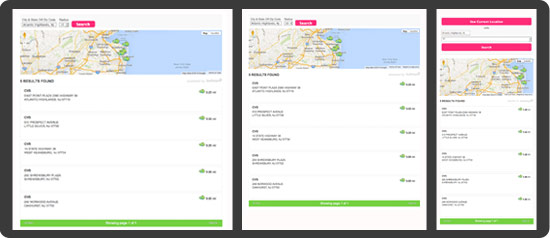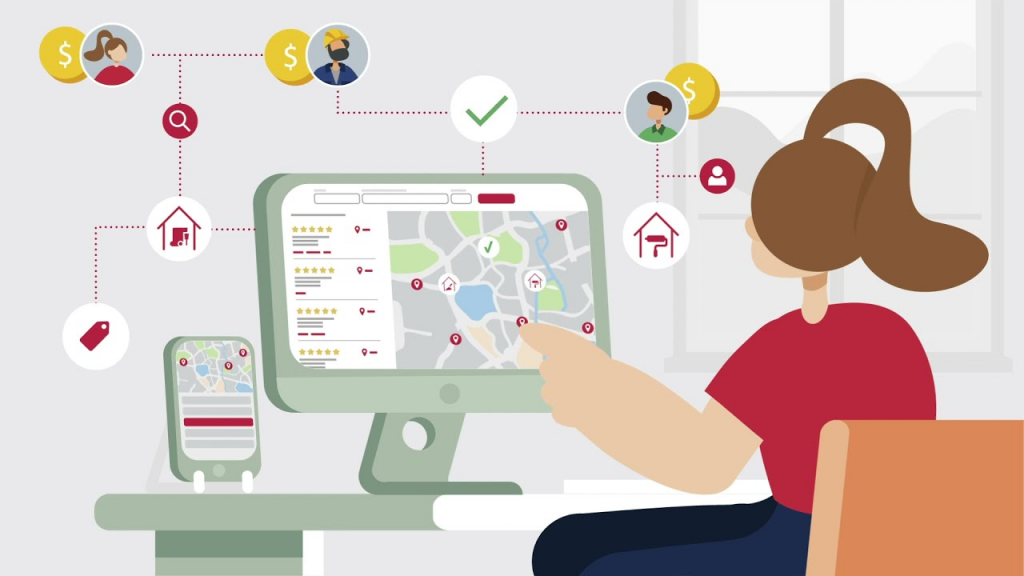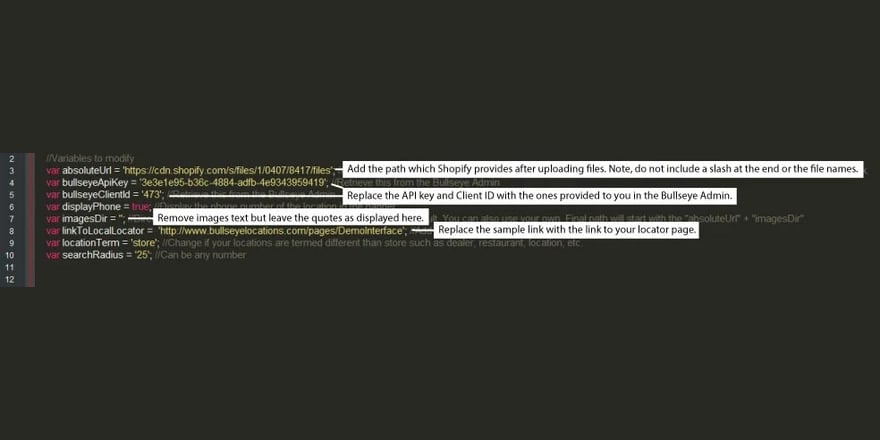For multi-location businesses, a simple way to point customers to local offices, dealers, and retailers is a must. It is often done through website store locator software…but using a free option could be a huge mistake.
Free store locator apps might suffice for smaller businesses that only operate a few locations, have just one or two simple product lines, or work with a small, select number of dealers. For larger multi-location firms that understand the value of online marketing, it’s important to choose software that’s much more capable of meeting the challenge.

A premium store locator software like Bullseye is better equipped to handle the needs of larger organizations.
Still unconvinced? Here are 5 major reasons a free store locator just doesn’t cut it for the online presence or sales strategy of a multi-location business:
1. A User Experience (UX) That Turns Off Website Visitors
Not every website is created equal. For multi-location businesses, your website design might be either a pleasant or unpleasant experience for customers who are ready and willing to buy.
That makes dealer locator software with great UX design an essential tool to have. If the design of your Where-to-Buy pages eliminates friction and gives customers what they need to know as fast as possible, you’re on the right track. If, however, your customers run into difficulties when looking for your local stores and authorized dealers, it’s easy for them to get distracted — and for you to lose business.
A good UX may not come with a free store locator. If you’re using such a solution, your website visitors might encounter the following:
- Slow-loading locator pages
- Hard-to-find information (for example, no map, or one that lacks geolocation detection)
- Store details that are out of date
- A lack of product availability data
- No immediate way to take action (like submitting an inquiry, or clicking to instantly call a dealer or store)
In addition, depending on the free software, a lack of integration with tools like Google My Business (GMB) or XML files might make keeping store data accurate a challenge. The problem only compounds with the more locations your business has to account for. In the end, your web users are the ones affected the most.

A premium, paid solution like Bullseye solves this problem for you by ensuring full integration with common customer-facing web apps, generating dynamic and personalized Where-to-Buy pages, and providing smooth navigation between local store and dealer listings. All of these features fall right in line with good UX principles.
2. Incomplete Pages That Drive Users to Search Elsewhere
A big issue with many “standard” locators is they do not help customers pick the right location for their needs. If it’s a service-based location, like a contractor, are they available on weekends or evenings? What products do they carry and install? Many customers may also look for user reviews, even leaving your website to do so. Any factor that pushes customers to leave your website opens them up to distractions and competitors, and may cause you to lose the sale.
When you provide a comprehensive local page for each location, you equip your customers to pick the location that’s right for their requirements, availability, or preferences. Customers who are empowered and take control of their decision will also become more invested in your site, products, and locations. There is a sense of ownership in their final decision.
Local pages are a great platform to present all the information a customer may want. They should be well integrated and branded, and inquiries should flow through to your CRMs. Not to mention, they are a huge advantage in the local SEO space.
3. Compatibility Issues and Bugs Due to a Lack of Updates
If you rely on free software for important aspects of your web presence, you might end up paying a heavy price: namely, security breaches.
Security vulnerabilities plague many free software products. Some software is open source or “freeware” produced by well-meaning professional or student developers, but this often means the creator lacks the motivation or capital to continue working on new releases. As backend elements like your web host’s servers, your content management system (CMS), and other components are updated, free software layered on top of your site (like a free store locator) can remain in an outdated state.

If that happens, your Where-to-Buy pages may not keep up with web visitor queries, high volumes of traffic, or other general website usage patterns. Depending on your CMS and web host, your locator pages can easily be rendered inaccessible or impossible to read.
In addition, some free store locator apps aren’t hosted in the cloud, but depend on manual downloads for each new release. It’s easy to miss these updates, allowing incompatibility issues and bugs that can hurt your website’s performance to spring up.
Paid platforms are much more likely to offer dedicated support and assurance of continual software updates. The best store locators are also cloud SaaS platforms.
That means there’s never a compatibility issue your IT team has to suddenly worry about fixing. Bugs that could hurt your user experience and website ROI are quickly caught and fixed.
4. Vulnerability to Hackers and Malware
Free store locator software isn’t worth the “cost” for yet another reason: it can easily be hacked.

According to Accenture, 67% of businesses feel their cybersecurity risks are increasing, and according to Pew Research, 81% of American consumers feel the risks of businesses collecting their info outweigh the benefits. Cybersecurity is a huge issue in modern times, and once web user trust is broken, it’s very hard to rebuild.
What can this look like with your locator pages? Malware might be embedded in Where-to-Buy pages that your prospects land on. That malware can easily find itself on user devices and cause havoc — stealing your users’ data, ruining their file systems, and taking over the functionality of their computers.
This is particularly worrisome when we think about free store locators that “live” next to WordPress plugins. The popularity of WordPress as a CMS makes its plugins an unfortunate target of hacking attempts. Because it’s so easy to miss plugin security updates, cybercriminals can exploit existing vulnerabilities on your site to install malware. This hurts your customers, and in turn, your business.
Avoid the pain with premium dealer locator software. Most will have built-in protections such as IP searcher tracking (which can catch malicious bots and human hackers, as well as unscrupulous competitors), and will be hosted on secure cloud servers. They’re secure platforms that defend your business against the latest cyber attacks, protecting both your customers and your website.
The upside? When customers search your website for authorized dealers and stores, they’ll feel secure, and will truly be secure.
5. Lack of Powerful Marketing Features for Increasing Leads and Sales
Probably the most important feature that free store locator software tools lack is a way to capture and nurture leads.
Lead generation is a top business challenge for any multi-location business, so this is a major drawback that can affect the bottom line. Free store locators will almost certainly lack tools for capturing your leads’ names, phone numbers, and email addresses, which means customers will constantly slip through the cracks.
Even if your visitors find the right dealer and make a purchase, will you have any way of tracking or following up on them? Free tools may lack integration with CRM and email marketing apps that facilitate lead nurturing, an essential part of growing your bottom line.
Premium platforms avoid this issue. Bullseye, for example, generates customizable lead capture forms on your Where-to-Buy pages. As a result, both your company and your local stores can access and follow up on leads with ease. You’ll retain insight into buyer journeys and have opportunities to build customer loyalty.
By going the premium route, you can forge better relationships with independent dealers as well. You’ll be able to prove ROI and drive more foot traffic to high-performing locations, ensuring your products have an edge over the competition.
The right store locator solution is much more than a helpful tool for your customers’ convenience. It’s a critical value add for multi-location businesses that want to scale. Sticking to a free solution means leaving lots of revenue and many competitive advantages on the table.

The Right Store Locator Software for Multi-Location Businesses Is Worth the Investment
When it comes to an important digital asset like your store locator pages, it’s best not to take chances. Free solutions simply don’t hold up to scrutiny on all the important points.
For large multi-location businesses, the store locator should do more than list your outlets and retail shops. It should engage customers with a good experience, securely move them towards the point of sale, and capture lead information so you can follow up.
One premium platform does all of the above, and does it well: Bullseye. It provides a secure, always up-to-date web browsing experience. It lets you capture leads, supervise the buyer journey, and forge stronger relationships with dealers and retailers for a better online ROI.
To see Bullseye’s superior features and make sure your business isn’t missing out, schedule a free assessment of your current store location pages today.




